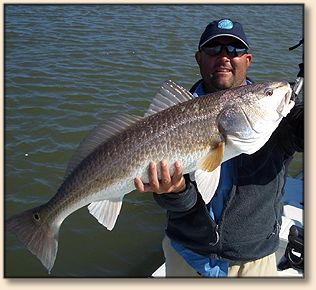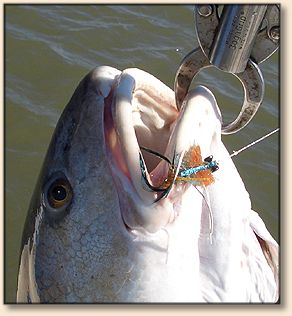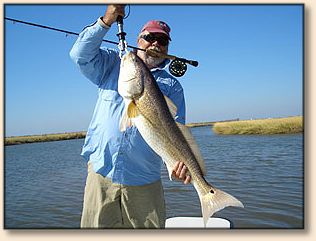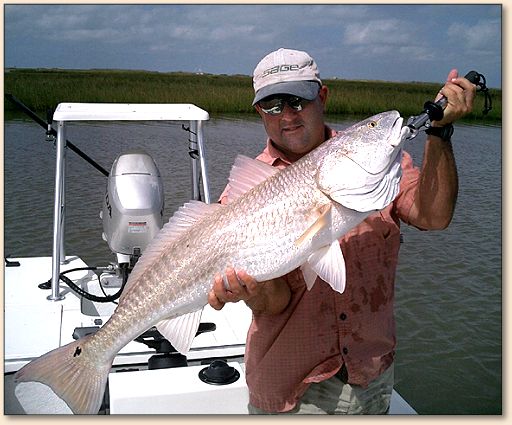For all the mess Katrina did to the lower Delta of
Louisiana, fish did better than people in general. I
just fished with Captain Brian Carter of
(captainc@voodoocharters.com) at the end of Oct and had
two of the best days I have ever had down that way. That
is saying something as this place can produce thirty plus
reds a day if the conditions match a caster's abilities.
Brian, Rich and all the guides I fish with down south of
New Orleans lost just about everything. Rich's house north
of Port Sulfur was washed through with his boat visiting his
neighbor down the road and both trucks planted in his yard.
Brian's boat ended up in a tree after he took it to a safe
place at his folk's home in Pass Christian. All his
belongings left behind were soaked and molded into mush.
Another guide has not found either of his boats yet and he
lived in the city so has a mess of a house too. I did not
expect to fish there for many months until Brian came up for
air and said, "fights on" the last week of October.
Brian got his stuff in line first as he did not lose a house
(he rented) and his fights with FEMA and the insurance
companies were simple by comparison. He was loaned a boat
by a good customer and then found a nice used Hell's Bay.
He got his Bride-to-be in a rental trailer and, along with
a couple of other guides, rented a second trailer to put up
fishermen. There are no other rooms to be had in the area.
After figuring out how to get through all the homeland
security, police roadblocks and necessary permits halting
movement through the devastated areas, the guides got out
on the water and found the fish were still out there. The
marsh on the west side of the river is somewhat "worn-out looking"
but not damaged as badly as the east side. With no commercial
fishing, shrimping or crabbing and nobody who does not live
there on the water, the fish are having a fine time. This
area took a thrashing from Katrina and some flooding from
Rita but in comparison to either the western and eastern
marshes, this one is in great shape.
This time of the year is usually special for the larger
fish running the flats and this year seems to be better
than ever. The storm just cleaned out the weeds that die
off in the winter a little early leaving the food supply
out in the open for the big fish to scoop up.
My drive there from the east was about as long as usual
but the devastation of the storm starts two states from
New Orleans and increases exponentially through the city
and slacks off a little on the West Bank only to ramp up
to total devastation as you proceed down the delta. I
made the drive during the day, as there are no lights
after reaching the city for the most part. People are
driving the roads in wild ways and trucks are moving mounds
of trash, some of which ends up on the freeways. There is
not all that much highway traffic as not much is happening
and few live there yet. The I-10 bridge over the lake is
half back but I had little delay there either.
Going south from Brian's trailers in Jesuit Bend starts
you into the smashed area where the storm hit land first
with full power. The roadblock does not open until 6 AM
and you have to be back out by 6 PM. We drove down in the
dark but even that way the houses in the road and piles
of cars and debris are easy to see. We only went 25 miles
to Port Sulfur. That is about half way down and from there
on little is left standing. On down, most stuff is not even
around to find. The ramp is behind what was a hospital and
high school. FEMA and the National Guard are camped on the
sports field and have another checkpoint to get past there.
A boat and trailer might not be too safe otherwise.
We hit the water on day one with clear weather, 45 degrees
and NE wind of 15 to 20 MPH. Once away from the ramp it
looked like a normal winter day. Most of the structures
like fishing and hunting camps are totally gone but the
marsh grasses and dikes are still hanging on. The birds
are just getting back from wherever they went but not in
abundance yet. All in all, the beauty of the day seemed
to wipe out the bad stuff on the land and we were all
alone on the water.

We stopped on the way out to toss at and catch some seatrout
the birds were diving on and then reached clean water and
were fishing in about 20 minutes more. It only took five
minutes before the first couple of reds showed but they
were a little spooky. It might have been from the many
porpoise cruising the canals as they tear up the fish
something horrible. From the fourth fish on they started
attacking the fly like the fish of old from this area.
I did switch over to Rich Waldner's spoon fly to get
things rolling. His fly is especially good when the
grasses are heavy but works all the time even if it is
a little hard to throw in winds like we were experiencing
this day. I kept it on for these six pound fish and got
about half a dozen catches then switched back to my Easy
Crab when the fish should have been bigger and all the
shots were straight up wind. We fished four or five
different areas this day and ended up with about 22
fish total. There was a black drum in there and I
even got Brian to come down from the tower once to
hook a second fish while I was fighting a big one.
He got that one hooked and another came at us. For
a moment we started to get a third pole out for that
one coming at us but the two trashing already took
all the efforts we had. Monsters did not show this
day but we did not fight the waves to get to where
they were. Our biggest for the day was probably
about eight pounds. The smallest was five.
The day ended just as pretty as it began. There never
was a cloud in the sky while the wind kept on at 20 MPH
on into the night. I commented on the way home that it
would be hard to beat this day and just getting out on
the water for another day would be reward enough.
Day Two
The wind dropped to 10 to 15 for the start and there were
still no clouds. With bellies full of perfect steaks from
the night before, we decided to try for the bigger fish.
It took about forty minutes and a couple of stops to get
to the clean water out where the big guys roam. I knew
something was up when the first fish appeared coming at
the boat and Brian said, "don't throw at that one." It
was a nice 6-8 pound beauty! Within five minutes I was
tossing at monsters, in the twenty-pound plus size. These
first three were in deep water and I needed to switch to
a heavier fly and rod. Out came the nine-weight rod with
a sink tip line and my special heavy weight "Miami dolphin"
crab pattern.

I caught a big black drum much to Brian's scorn because I
could not pass up the chance. The next fish to show was
in about a foot of water and his back was almost out. I
tossed, he lunged, I snatched and he missed. Instead of
spooking he went wild trying to find the crab. I got it
back to him and he grabbed it again and the fight was on.
The big guy ran off eighty feet of line before I got him
slowed to a stop. With him out there thrashing two more
fish the same size appeared. Brian stuck his Power-Pole
in the mud and got hooked to the second fish. His fight
ended before it started with that one when it came unbuttoned.
His second cast hooked him again only to come off again.
He packed it in and coached me to landing mine. I had him
to the Boga in about five minutes but he did put up one heck
of a pulling contest. This first one was eighteen pounds.
Two or three hours later we had three this size, two in the
14-15 range and a couple at 10 pounds. My right arm was
about to fall off. All these were in shallow crystal clear
water and there were actually several more that escaped after
short fights. The big barbless hooks did not hold sometimes
especially when the fish was hooked chasing the hook right
at the boat.
 Once we found a big fish up in a river we could not pole
up and I got out and walked an exposed bar to try and get
him. I didn't get this one but when I got out again to
do the same the fish swam right up under the place I was
standing and when I got the fly in front of him he just
rolled over and took it off the bottom like a mullet
flashing his large flat side at us. This fish ran past
the boat and back out the river we had poled up. It was
a Chinese fire drill getting back in the boat to follow
the fish back into the open water. Another big black drum
got caught when I threw at a big red only to have the black
fish beat him to it.
Once we found a big fish up in a river we could not pole
up and I got out and walked an exposed bar to try and get
him. I didn't get this one but when I got out again to
do the same the fish swam right up under the place I was
standing and when I got the fly in front of him he just
rolled over and took it off the bottom like a mullet
flashing his large flat side at us. This fish ran past
the boat and back out the river we had poled up. It was
a Chinese fire drill getting back in the boat to follow
the fish back into the open water. Another big black drum
got caught when I threw at a big red only to have the black
fish beat him to it.
We left the big fish area before I broke my arm to look at
a couple of more spots. On the way we came upon a couple of
porpoise slapping the heck out of the water and slurping up
mullet. Evidently the mommy of the two did like us driving
through her area and she swam past us and jumped right in
front to splash down and drench us. She saw the wind caused
some of the water to miss and adjusted to the right and jumped
twice more making sure I was wet from nose to tail. We were
going about twenty MPH on the plane at the time.
I did catch one more redfish but the day was already full of
fish for me, a dozen reds total. The last fish to pop up was a
nice sheepshead. I got it interested and searching with the
first cast. I hooked it on the third try. These toothy little
guys are hard to hook on a big 2/0 hook but this one worked
it to death and got to meet me for the effort. He was a five
pound fish.
My smile, on the way in, probably looked like the one on the
Nurse's face through the front window of the helicopter in
the movie Mash after the night with the dentist, Painless.
Yes, I feel for the folks down that way and as a family we
have given much money to funds for each hurricane as well
as the tidal wave and earthquake victims elsewhere. It seems
trivial to fish during these times but Brian and others are
trying to survive too. Helping jump start the area means
also helping them get back to work. I think this winter
will offer some fine fishing, especially in this eastern
marsh area of the Delta. Brian and others are up and
running with the added perk of a place to stay. Only go
if you are willing to risk your arm on some of the big fish
down that way. Call Brian at 504-329-5198. ~ Capt Scud Yates, scudyates@cox.net Oct 2005
|



